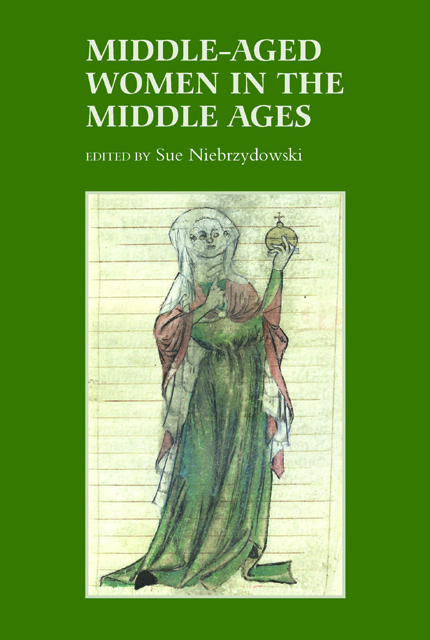Book contents
- Frontmatter
- Contents
- List of Plates
- Abbreviations
- Contributors
- Introduction: ‘Becoming bene-straw’: The Middle-Aged Woman in the Middle Ages
- 1 The Age of Discretion: Women at Forty and Beyond
- 2 Seeking the Middle-Aged Woman in Medieval Wales
- 3 Middle Age in Romance? Magic, Enchantment and Female Power
- 4 Age and Desire in the Old English Life of St Mary of Egypt: A Queerer Time and Place?
- 5 The St Albans Psalter: Sex, Desire and the Middle-Aged Woman
- 6 Speaking Volumes: the Middle-Aged Woman and the Book in Medieval England
- 7 ‘Late hir seye what sche wyl’: Older Women’s Speech and the Book of Margery Kempe
- 8 Preparing for Mature Years: the Case of Margaret of Anjou and her Books
- Select Bibliography
- Index
6 - Speaking Volumes: the Middle-Aged Woman and the Book in Medieval England
Published online by Cambridge University Press: 14 February 2023
- Frontmatter
- Contents
- List of Plates
- Abbreviations
- Contributors
- Introduction: ‘Becoming bene-straw’: The Middle-Aged Woman in the Middle Ages
- 1 The Age of Discretion: Women at Forty and Beyond
- 2 Seeking the Middle-Aged Woman in Medieval Wales
- 3 Middle Age in Romance? Magic, Enchantment and Female Power
- 4 Age and Desire in the Old English Life of St Mary of Egypt: A Queerer Time and Place?
- 5 The St Albans Psalter: Sex, Desire and the Middle-Aged Woman
- 6 Speaking Volumes: the Middle-Aged Woman and the Book in Medieval England
- 7 ‘Late hir seye what sche wyl’: Older Women’s Speech and the Book of Margery Kempe
- 8 Preparing for Mature Years: the Case of Margaret of Anjou and her Books
- Select Bibliography
- Index
Summary
The question framed by the title of this essay is ostensibly a simple one: how did middle age affect women’s roles as commissioners, owners and readers of books? If they were married, and had survived the rigours and dangers of childbearing, did their interest in the sphere of cultural activities develop as they grew older, and were they able to achieve a degree of autonomy in pursuit of them? If they did, to what extent was this dependent on their marital and financial positions, or on their class status? Before it is possible even to consider these questions another is raised, for it is not even immediately evident what age group we should be examining: what becomes clear from life-cycle studies, innovative and informative as many of them are, is the lacuna where middle age should be. Other stages of life – the menarche, age at marriage, widowhood and old age – have all been subjected to scrutiny, but it is as though women pass through a barrier of invisibility when they enter middle age. There is, though, a medieval text which deals explicitly with women’s ageing, the Cause et Cure, generally attributed to the abbess and visionary Hildegard of Bingen (1098–1179); this work tackles all aspects of women’s sexuality and reproductive cycles with judicious specificity:
From her fiftieth, or sometimes from her sixtieth year, a woman feels some irritation and dries out around the windowlike sites of her body … From the age of fifty or, for some women, sixty, menstruation ceases and the uterus begins to shrink and to contract so that she can conceive no more offspring …
The approximate age of fifty for the menopause is not dissimilar to today, but it must be borne in mind that Hildegard (if she was indeed the author of this text) was writing from within the confines of a secluded group of women whose diet, if not luxurious, was consistent, and allowance should therefore be made amongst the general population for the effects of poverty, poor diet, illness and shorter lifespan. For the purposes of this study, however, if ten years either side of fifty is allowed, a working schema of the ages of forty to sixty can be used to establish a timeframe for looking at the middle-aged woman and the book.
- Type
- Chapter
- Information
- Middle-Aged Women in the Middle Ages , pp. 83 - 100Publisher: Boydell & BrewerPrint publication year: 2011



